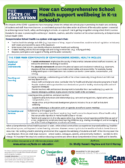How can Comprehensive School Health support wellbeing in K-12 schools?
Download the Fact Sheet! (493.11 kB / pdf)
DownloadThe impacts of the COVID-19 pandemic have increasingly shown the critical role schools play in promoting the health and wellbeing of students and staff. Now more than ever, a coordinated approach that takes action at all levels of the education system is essential to addressing mental health, safety, and belonging in schools. An approach that is gaining recognition among school districts across Canada for its value in promoting the wellbeing of students, teachers, and other members of the school community, is Comprehensive School Health (CSH).
Comprehensive School Health is a system-wide approach that:
- Teaches health knowledge and skills (e.g. importance of sleep, impact of screen time, social-emotional regulation techniques) both inside and beyond the walls of the classroom
- Understands that schools can directly influence students’ health and wellbeing
- Creates healthy policies that encourage safe and caring communities (e.g. bullying policies)
- Requires participation and support of family and the wider community
THE FOUR MAIN COMPONENTS OF COMPREHENSIVE SCHOOL HEALTH INCLUDE
1. Social and physical environments:
- A social environment emphasizes the quality of relationships between school staff and students, as well as the emotional wellbeing of students
- The physical environment considers the physical space and structures in school (e.g. classroom, playground) that are designed to promote student safety and accessibility. For example, having a designated space in the classroom that students can use for conversation, concentration, and calming.
2. Teaching and Learning
Increasing knowledge, understanding and skills of the school community through formal and informal learning opportunities:
- Ensure both curricular and cross-curricular time for health and physical education programs of study
- Provide students with opportunities to understand and practice healthy relationship skills and self-regulation strategies
- Provide teachers with professional development to look after their own wellbeing (e.g. work life balance strategies, address stigma around mental health in the workplace)
3. Policy
Creating policies, guidelines, and practices that:
- Support healthy behaviours and relationships (e.g. safe and caring policies, digital safety, active transportation, etc.)
- Revise school and professional development plans to include a focus on staff and student wellbeing
- Include wellbeing as a discussion point on agendas at staff and parent meetings
4. Partnerships and Services
Collaborating and engaging with:
- Various community school-based services (e.g. health promotion departments of local health units) that can provide expertise in mental health at low or no cost
- Parents and caregivers in diversity appreciation (e.g. sharing cultural experiences/identities as part of school projects) and social emotional learning initiatives (e.g. sharing knowledge of, and encouraging use of the ‘Zones of Regulation’ at school and home).
When a Comprehensive School Health approach is taken, entire school communities can experience improved wellbeing, healthier educational spaces, and improved student learning outcomes. However, research points to the need for schools to invest time and resources into building a health-promoting environment that supports the wellbeing of students and staff. While this may seem like a daunting task, there are small steps everyone – school leaders, colleagues, parents, and community members – can take to drive change. An important first step is to continue educating ourselves and others about Comprehensive School Health and its benefits.
Additional information and resources
The Podclass: Conversations on School Health
Building Healthy School Communities
Leveraging Pandemic Lessons to Heal
Byrne, J., Pickett, K., et al. (2016). A longitudinal study to explore the impact of preservice teacher health training on early career teachers’ roles as health promoters. Pedagogy in Health Promotion, 2(3), 170–183. doi.org/10.1177/2373379916644449
Byrne, J., Pickett, K., & Rietdijk, W. (2018). Teachers as health promoters: Factors that influence early career teachers to engage with health and wellbeing education. Teaching and Teacher Education, 69(1), 289–299. doi.org/10.1016/j.tate.2017.10.020
Koenig, A., Rodger, S., & Specht, J. (2018). Educator burnout and compassion fatigue: A pilot study. Canadian Journal of School Psychology, 33(4), 259–278. doi.org/10.1177/0829573516685017
Kolbe, L. J. (2019). School health as a strategy to improve both public health and education. Annual Review of Public Health, 40(1), 443–463. doi.org/10.1146/annurev-publhealth-040218- 043727
Langford, R., Bonell, C., et al. (2015). The World Health Organization’s Health Promoting Schools framework: a Cochrane systematic review and meta-analysis. BMC Public Health, 15(1), 130–130. doi.org/10.1186/s12889-015-1360-y
Russell-Mayhew, S., Ireland, A., et al. (2017). Reflecting and informing a culture of wellness: The development of a comprehensive school health course in a bachelor of education program. Journal of Educational Thought, 50(2&3), 156-181. www.jstor.org/stable/26372402?seq=5#metadata_info_tab_contents
Squires, V. (2019). The well-being of the early career teacher: A review of the literature on the pivotal role of mentoring. International Journal of Mentoring and Coaching in Education, 8(4), 255-267. doi.org/10.1108/IJMCE-02-2019-0025
Viner, R. M., Russell, S. J., et al. (2020). School closure and management practices during coronavirus outbreaks including COVID-19: a rapid systematic review. The Lancet Child & Adolescent Health. doi.org/10.1016/S2352-4642(20)30095-X

